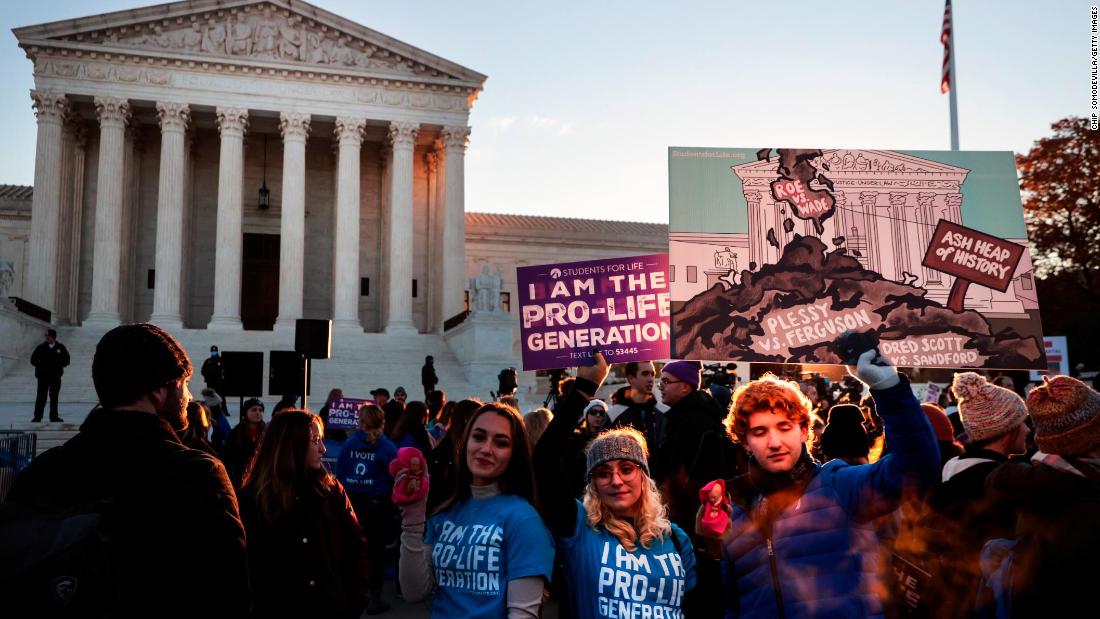The Supreme Court hears the most important abortion case in 30 years as it considers a state’s request to overturn Roe v. Wade
The Supreme Court is set to hear oral arguments soon on a case concerning a Mississippi law that bans most abortions after 15 weeks of pregnancy.
Mississippi is asking the justices to uphold the ban and overturn Roe v. Wade (1973) and Planned Parenthood v. Casey (1992). The state calls those landmark decisions “hopelessly unworkable” in legal briefs.
Arguments are scheduled to last for 70 minutes, but if past is precedent, the court will go overtime.
These are the key players of today’s arguments and how the event is expected to unfold:
At 10 a.m. ET, Mississippi Solicitor General Scott G. Stewart – who served as a law clerk for Justice Clarence Thomas in 2015 — will take the podium and his former boss is likely to ask the first question.
Thomas— who was largely silent from the bench for years — has been a vocal participant at oral arguments this term after the Court changed its questioning format.
Thomas has repeatedly urged the court to overturn Roe v. Wade, saying that there is no right to an abortion found in the Constitution. Earlier this year he was praised for his position on “unborn life” by Senate Minority Leader Mitch McConnell, a Kentucky Republican.
When the justices agreed to hear the Mississippi case last May after months of closed door deliberations, the question they agreed to decide was whether “all pre-viability prohibitions on elective abortion are unconstitutional.”
But when Mississippi filed its opening brief it went much further asking the justices to overturn Roe and Casey. Some justices might see that as a bait and switch forcing them to address a much bigger question. Watch Chief Justice John Roberts who might express institutional concerns with overturning a decision from so long ago.
All eyes will also be on Justice Amy Coney Barrett, whose vote to take up the case was likely critical. The court is now composed of three of former President Trump’s nominees, recall Trump vowed to appoint “pro-life” judges.
After Stewart wraps, Julie Rikelman, the Litigation Director at the Center for Reproductive Rights which is representing Jackson Women’s Health Organization, the only licensed abortion facility in Mississippi, will be next. She is arguing on behalf of Jackson Women’s Health Organization, the last abortion clinic in the state. In March of 2020, Rikelman won a case striking down a Louisiana abortion law when Roberts sided with the liberals on the court.
Today, Rikelman will forcefully argue that the court should “reject the invitation to jettison” a half century of precedent. In briefs, she zeroed in on the fact that many of Mississippi’s current arguments were rejected by the court some 30 years ago in Casey.
After Rikelman, Solicitor General Elizabeth B. Prelogar, a former clerk to the late Justice Ruth Bader Ginsburg and Justice Elena Kagan, will step up in support of the clinic. Prelogar, the Biden administration’s top lawyer before the Supreme Court, said in legal papers that overturning Roe and Casey would “be a profound disruption.” Prelogar urged the justices to consider what would happen if the justices decided to return the issue to the states.
Because Mississippi brought the challenge, Stewart will have the chance to return to the podium. He’s likely to reiterate his main point: “Under Roe and Casey the Judiciary mows down state law after state law, year after year, on a critical policy issue,” he argued in briefs. “That is dangerously corrosive to our constitutional system,” he wrote.
![]()


